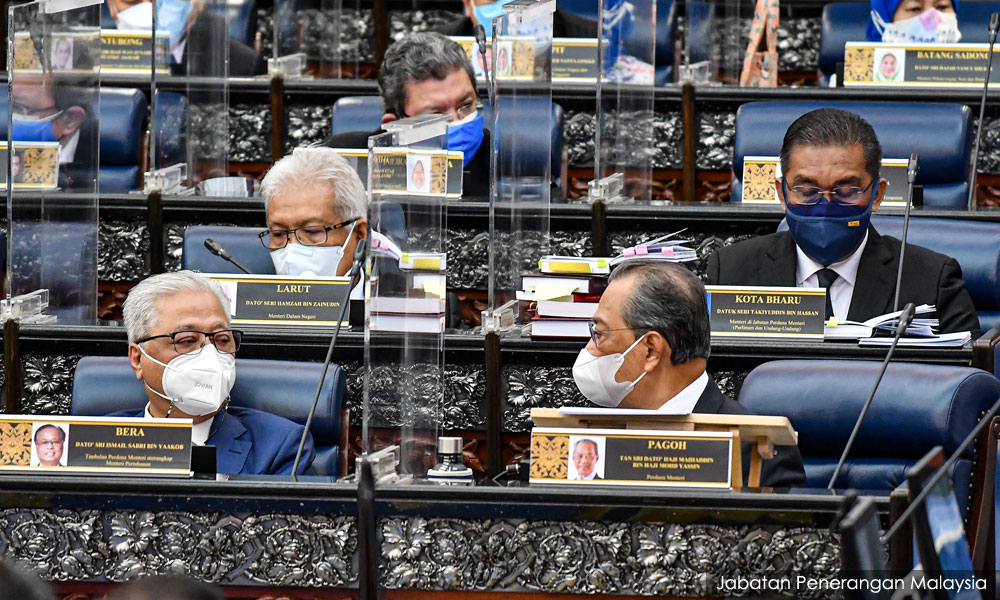An interim prime minister is appropriate when the country is facing an uncertain political crisis, said Umno Veterans’ Club secretary-general Mustapha Yaakub.
When asked who would be suitable to hold the post, Mustapha named Deputy Prime Minister Ismail Sabri Yaakob.
“It is reasonable and appropriate to resolve the political crisis facing the crisis of confidence of MPs in the prime minister and to ease the rift between Istana Negara and the Prime Minister's Office (PMO),” he told Malaysiakini.
He said this when asked to comment on former finance minister II Johari Abdul Ghani’s remarks on Friday (July 30) that the opposition and the government should support the appointment of an interim prime minister as the country is facing various crises including constitutional, health, economic and political issues.
Johari, who is also a member of the Umno supreme council, said that it was to ensure that the country’s vaccination programme was not affected by the political crisis.
“The country is currently facing a constitutional crisis following the rebuke issued by Istana Negara and the counter-statement from the Prime Minister’s Office (PMO). It does not bode well for the people and the country,” said Johari.
Johari said the country could not afford to face a constitutional crisis that could affect the country’s future in recovery from Covid-19.
“Therefore, it is time for leaders from all political parties, whether from the government or the opposition to support the appointment of an interim prime minister so that the government can focus on vaccination efforts as only 19 percent of Malaysia’s population has been fully vaccinated,” he said.
Reasonable interim PM
Political analyst from Universiti Malaya Awang Azman Awang Pawi said in addition to an interim prime minister, an interim government can be formed as well if the administration could not prove its majority support in Parliament. This is if the Agong is unsatisfied with and disapproves of the performance of the current government as well.
“But it needs to be supported by elected party leaders and respected and accepted by all parties and also involve certain technocrats and be approved by the king,” he told Malaysiakini.
Clearly, the purpose is not only to address Covid-19 but also to focus on economic and social recovery before the 15th general election (GE), given that preparations for the polls in the new norm need to be done thoroughly.
“It means that the interim PM proposal is reasonable to ensure that this election is neutral.
“Then there must be a valid agreement that whoever holds this interim position will not be nominated as prime minister in the future to avoid personal interests when he is the interim prime minister,” he said.
The Dewan Rakyat sitting on Monday has been postponed to a yet to be determined date, due to a “Covid-19 risk”.
According to a letter to MPs from the Dewan Rakyat secretary’s office, the order to postpone the sitting was relayed to the speaker’s office from Prime Minister Muhyiddin Yassin as per Standing Order 11(3).
Curiously, Standing Order 11(3) gives the prime minister the ability to summon Parliament earlier if there is an adjournment and does not say anything about postponing Parliament.
However, Standing Order 11(2) does allow the prime minister to vary the dates fixed for the Parliament sitting.
Earlier, Istana Negara issued a statement to convey the Agong’s deep regret over the way the emergency ordinance was revoked by the Perikatan Nasional government.
The Prime Minister's Office, in response, defended its decisions saying they had acted within the Federal Constitution, which also stated that the king must follow the cabinet’s advice.
In response to the postponement of Parliament, PKR president Anwar Ibrahim has accused the government of using Covid-19 as a ruse to obstruct proceedings. - Mkini





No comments:
Post a Comment
Note: Only a member of this blog may post a comment.